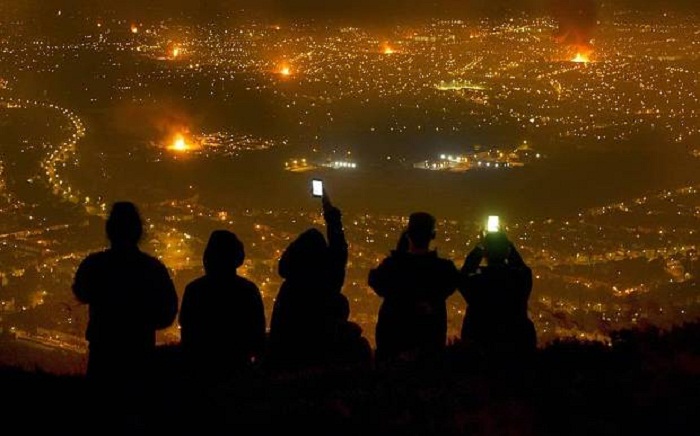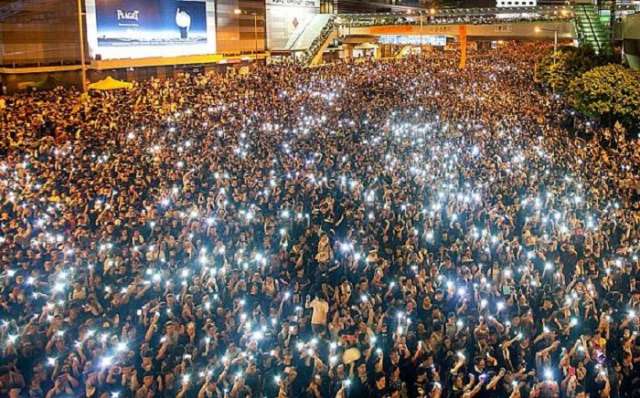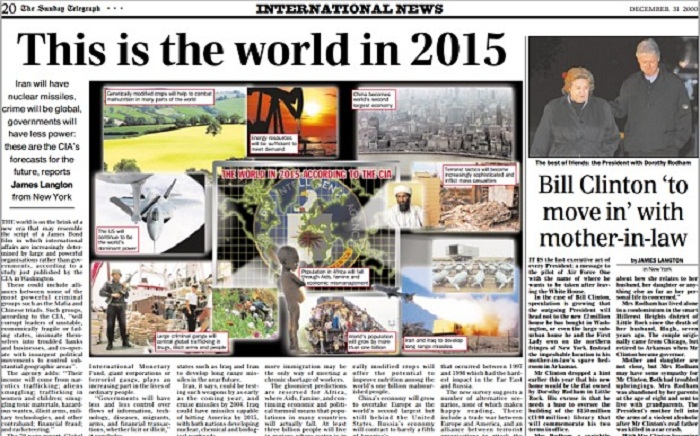Way back in the futuristic year 2000, the CIA convened a group of experts from outside the Agency. Their mission: to gaze into the near future and predict 2015 would look like.
The result was a 70-page report covering everything from the rise of nanotechnology through oil shocks and demographic change to the fate of the global economy. You can read the full document here.
Fifteen years later, how right were they about the future we are living through now?
Many of their conclusions were uncontroversial: water would still be wet, sugar would still be sweet, and ethnic and religious tensions would continue to drive conflict in nations where governance is poor.
But other predictions have fallen flat – such as the notion we’d all be eating cloned beef burgers, or that North and South Korea would be unified.
Read on to find out just what they got right and wrong about the world of today.
The internet revolution: RIGHT

The CIA’s experts correctly predicted the explosion in digital and mobile technology which has transformed the world as we know it.
"Internet access holds the prospect of universal wireless connectivity via hand-held devices and large numbers of low-cost, low-altitude satellites"
“Universal wireless cellular communications”, they said, would create “the biggest global transformation since the industrial revolution.” Looking at the way smartphones have proliferated across the planet, putting seven times more computing power than the chess computer which beat Gary Kasparov into the palm of your hand, who could disagree?

The “IT revolution”, as they called it, would also have political consequences. In the Middle East, a “web-connected opposition” would pose new challenges to authoritarian regimes – as it did in the Arab Spring.
Meanwhile, the same technologies would create new avenues for conflict between states. This was borne out in reality by Chinese and Russian cyber-attacks in the USA and by America’s own use of a computer virus, Stuxnet, to sabotage the Iranian nuclear programme.
The biotech boom: HALF-RIGHT
The CIA was overly optimistic about the effects of biotechnology. Personal genomic profiling and artificially grown replacement organs would be commonplace, it said. Animals would be cloned to provide meat, while terrorists would genetically engineer new and dangerous diseases.
They even raised the spectre of the super-rich living “dramatically” longer than everybody else thanks to advances in medical technology.
"Cloning will be used for such applications as livestock production"
Some of this now seems fanciful. There is no longevity treatment for rich old people (unless they`re keeping it secret from the rest of us).
But in two areas the CIA were right. The price of genomics has dropped dramatically in the past five years and the NHS is attempting to sequence the DNA of 125,000 people to help fight cancer.
And it was right about GM crops. Despite opposition, GM breeds have swept across the world, accounting for 82 per cent of global soy bean hectares, 68 per cent of cotton, and 30 per cent of maize.
The rise of Russia: WRONG

The CIA could see that Russia might react badly to its loss of superpower status, and that it would use its gas reserves as a lever to regain it.
Indeed, resistance to the “new American century” – as one contemporary think tank termed it – is an explicit concern of Russian foreign policy.
But the CIA thought that the “most likely outcome” would be a weak Russia, linked into international diplomacy primarily through its veto on the UN security council.
Instead, Vladimir Putin has built a web of influence from Greece to Syria, intervening in foreign wars, annexing new territory, and frustrating Western ambitions. Rather than the predicted 2,500 nuclear warheads, he has over 8,000.
Other failed geopolitical predictions include the reunification of North and South Korea - which never happened - and the creation of a Palestinian state alongside Israel.
After escaping numerous CIA assassination plots in the 1960s, Cuban leader Fidel Castro has thwarted his old enemies once again – by failing to die.
Population: HALF RIGHT
The report correctly believed that world population would grow to over 7 billion, and that it would slow, or even fall, in Russia and eastern Europe. That`s true: Russia has fewer people today than in 2000.
But it was wrong about the ill fortunes of Africa. Instead of declining due to the AIDS epidemic, populations in sub-Saharan countries have shot up, while their economies have defied expectations.

The West`s demographic crisis: RIGHT
The CIA foresaw how ageing populations in developed countries would cause a slow crisis.
It’s worth quoting their report in full:
Quote The declining ratio of workers to retirees will strain social services, pensions, and health systems. Governments will seek to mitigate the problem through such measures as delaying retirement, encouraging greater participation in the work force by women, and relying on migrant workers.
“Immigration will complicate political and social integration: some political parties will continue to mobilize popular sentiment against migrants, protesting the strain on social services and the difficulties in assimilation.
“European countries and Japan will face difficult dilemmas in seeking to reconcile protection of national borders and cultural identity with the need to address growing demographic and labor market imbalances. “
Sound familiar?
The Financial crisis: WRONG
The report expected high levels of growth throughout the noughties – and this was true, to a point.
“The global economy is well-positioned to achieve a sustained period of dynamism through 2015,” it said. “Global economic growth will return to the high levels reached in the 1960s and early 1970s.”
It did consider the possibility of financial crisis, but spent most of its time talking about the risks to developing countries who had failed to reform - that is, liberalise - their financial systems.
Instead, lax regulations caused a banking collapse in the USA itself which brought down the global economy and sparked a new conversation about the limits and wisdom of capitalism.
And the EU? By now it would be "relatively peaceful and wealthy", perfecting "the final components of EU integration".
International terror: HALF RIGHT
The CIA`s concern about more sophisticated and lethal terrorist attacks was justified very quickly with the events of September 11, 2001.
But it couldn`t have imagined the extent to which terrorism would define the foreign policy of the West for the next ten years.
Perhaps only the collapse of Lehman Brothers can claim the same influence on American politics as the fall of the Twin Towers.
Beyond this, the CIA`s experts saw insurgent groups, drug smugglers, and criminal gangs across the world exploiting globalisation to band together into ever-larger networks.
They would even traffic in nuclear, biological, and chemical weapons – which would be increasingly likely to be used against the West.
It was a nightmare vision of amoral international evil pieced together from the ashes of the Cold War, its tentacles spreading across borders, selling weapons of mass destruction to the highest bidder.
That hasn`t exactly come to pass. But the reality might actually be worse.
"Isil has used chemical weapons it looted from the Syrian government and is working on producing its own"
The Islamic State of Iraq and the Levant is a sophisticated terrorist organisation that carries out, or at least inspires, attacks all around the world. And it`s funded through a broad spectrum of criminal activity, from oil sales through antiques trading to taxation. It is a criminal terrorist entity for all seasons, with fingers in many pies.
No, the US has not suffered a dirty bomb attack or a genetically engineered disease outbreak. But Isil has used chemical weapons it looted from the Syrian government and is working on producing its own. And its territory encompasses the site of a clandestine nuclear reactor destroyed by Israel in 2007 - which would otherwise now belong to the group.
But unlike the criminal networks imagined by the CIA, Isil is not just trying to make a profit. It has its own apocalyptic ideology which puts it at ground zero of a final confrontation between Islam and the West.
What will today`s experts, predicting 2030, make of that?















































